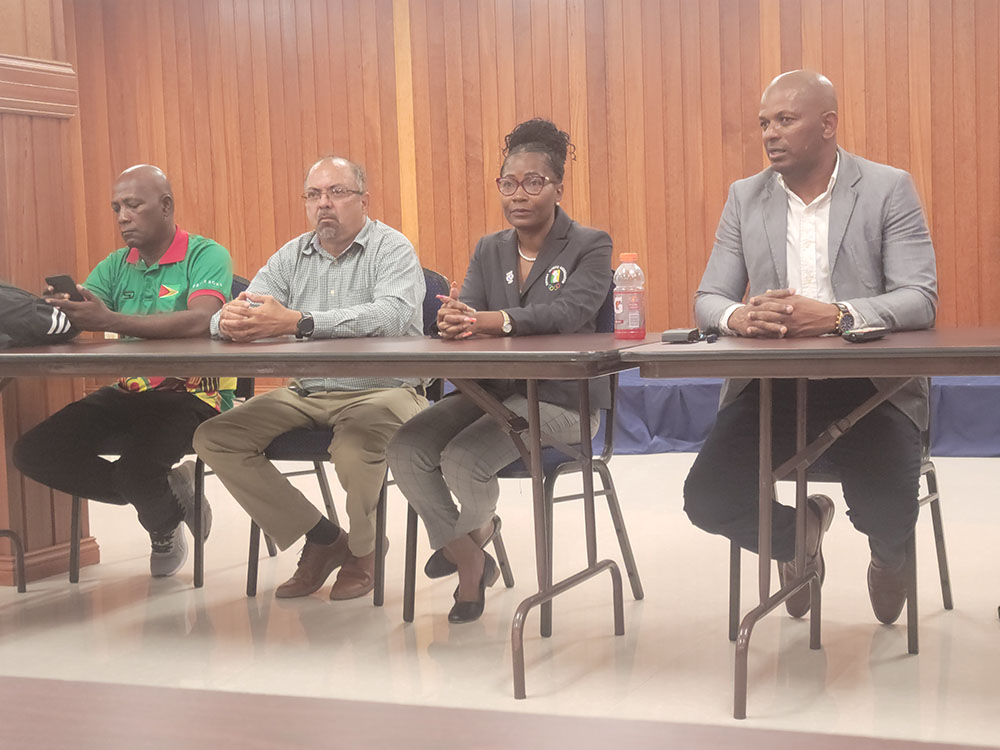With the 2024 Olympic Games done and dusted, the Guyana Olympic Association (GOA) is looking ahead to the next two Olympic cycles (2028 and 2032), with its President Godfrey Munroe calling for a ‘reset’ among the stakeholders of Guyana’s sports fraternity yesterday.
Munroe’s idea is to start afresh, and to this end, he revealed that the GOA is embarking on several new initiatives to help foster development in the country’s sports scene.
The experienced sports administrator was at the time speaking at a GOA press conference, which was called a debriefing exercise at the Olympic House in Liliendaal. With the curtains drawn on Guyana’s participation at the 2024 Olympics in Paris, France, Munroe noted that the dawn of the new Olympic cycle presented “a key opportunity for all key stakeholders to reset.”
While Munroe and his GOA Executive only took up office just over a year prior to the 2024 Olympics, a time frame not adequate enough for positive results with regard to the Olympic Games, heading into the 2028 Olympics, the GOA has made a step in the right direction by engaging with a strategic consultant from France, Laurent Torrecillas, who will be helping the GOA craft a strategic and operational plan for 2024-2032 with the input of key stakeholders such as National Federation heads, coaches, and the media, as well as athletes themselves.
Munroe also touched on the subject of finances, explaining to the media that currently the GOA supports 47 athletes and 24 coaches with a monthly stipend of $40,000. This sum, he revealed, was increased from $20,000 under the tenure of the current executive. However, Munroe also acknowledged that the current stipend is not enough, but the increase is a step in the right direction.
Additionally, through direct funding from the Olympic Solidarity Fund, 11 elite athletes have been receiving a monthly stipend of USD $700 (around GYD $140,000) over the last four years.
Continuing along that vein, it was also noted that Guyana has a wide range of sports disciplines (20+), which are supported through administrative programs from the IOC, where the GOA applies for funding to support those disciplines. The funding, according to Munroe, is accessed through applications, and when those applications are approved, there is a fixed amount of money for the calendar year that is allocated to the respective disciplines.
Looking ahead, Munroe spoke about moving to fully maximising access to the various forms of funding on offer from the IOC but noted that, importantly, accountability for those finances is paramount.
While the financing is an important aspect of the GOA’s future plans, they are also looking at the introduction of sports science as a fundamental area in helping to improve athletes’ performances through a collaborative effort with the Ministry of Health through their National Sports Clinic.
Also on the cards is a Memorandum of Understanding (MoU) that has been signed with the University of Guyana, which will see students undergo training and internships with the GOA, which will further bolster the area of administration in sports.
All in all, the initiatives of the GOA are all steps in the right direction as they seek to fulfil their responsibility as a key pillar of sports in Guyana.
While Munroe delved into the aforementioned, Aliyah Abrams, Guyana’s national 400m women’s record holder, was present virtually and commended the GOA for ensuring that the trip to Paris was the best she had experienced in terms of communication, travel arrangements, and the provision of suitable uniforms.
Guyana’s contingent to Paris included Abrams, Chelsea Edghill, Emmanuel Archibald, Raekwon Noel, and Aleka Persaud. Unfortunately neither of the quintet managed to progress beyond the preliminary round of their respective events, but Guyana’s Chef de Mission, Garfield Wiltshire, noted that they gave 100%, and it was the least that could be asked of the athletes.










